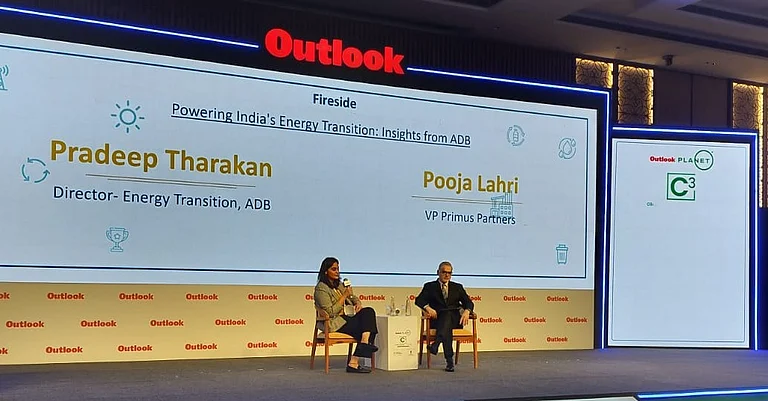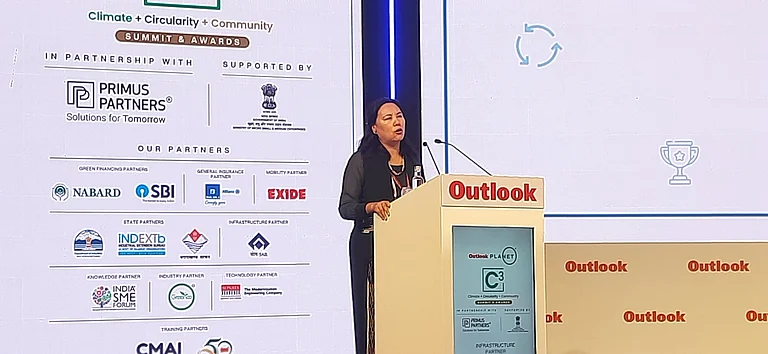The Outlook Sustainable Power Conclave 2025 was held on March 11, 2025, at the Bharat Mandapam Convention Centre, New Delhi, in collaboration with the Ministry of Power, GoI, with the singular objective of highlighting the Hon'ble Prime Minister’s call for an ‘Aatmanirbhar Bharat,’ a self-reliant nation that aims to make India energy independent by 2047. In the capacity of chief guest, Manohar Lal, Union Minister of Power and Housing & Urban Affairs, has exhorted the community of power sector experts to secure power to reach the 2047 goals.
The Power Conclave delved into strategies and processes aimed at positioning India as a global leader in sustainable power generation, transmission, distribution, regulation, trading and the connected ecosystem towards implementation of clean and appropriate technology, manufacturing and system-wide deployment promoting self-reliance towards a Net-Zero and Viksit Bharat.
The Outlook Sustainable Power Conclave was powered by Atlanta Electricals Ltd, a leading manufacturer of power and auto inverter duty transformers with a pan-India presence and operations spanning over 30 years. Aligning with the vision of sustainable power, Niral Patel, CMD of the Atlanta Group, partnered with the Outlook Conclave.
The associate sponsors for the conclave were Anvil Energy Pvt Ltd, NHPC Ltd, NTPC Ltd, PFC, Power Grid Corporation of India Ltd and REC Ltd. Supported by Capital Power Systems Ltd, the event saw the Millennial India International Chamber of Commerce, Industry & Agriculture as chamber partner and Excellent Group in the capacity of industry partner; the conclave was an immense success. Sandip Kumar Ghosh, publisher, Outlook Group, flagged off the conclave, highlighting the purpose and objective of the Outlook Sustainable Power Conclave 2025.
Just Transition of Energy for an Equitable Society
Speaking of Outlook Group’s journey on reporting various aspects of sustainability practices across industries and the current impact of start-ups and deep-tech, Indranil Roy, CEO, Outlook Group, laid emphasis on sustainability in the power sector. He extended a warm welcome to the Hon’ble Minister Manohar Lal and the distinguished delegates.
The keynote speaker, Siddharth Sharma, CEO of Tata Trusts, spoke of the role of sustainability as the apex of the Tata ecosystem. He touched upon the intersection of climate change, vulnerable communities and decentralised renewable energy solutions for a better future. Though India faces multiple timelines and competing tensions on the developmental and private fronts, he emphasised that it is on track to meet certain renewable energy targets by 2030 and achieve net-zero by 2070. He set the tone for discussion on ways to generate, distribute and access renewable energy, which constitutes about 47% of India's total installed capacity with the green dependence on non-fossil fuel-based energy sources like solar, wind, and hydro, while contemplating the role of the private sector in partnering with the government to build an equitable society.
Honouring the stalwarts of India's power sector, Dr M V Rao, CMD, West Bengal Electricity Regulatory Commission; Pawan Kumar Bansal, CMD; Capital Power Systems Ltd, Dhiraj Chalana, CMD, Excellent Power Infra Pvt Ltd; Niral Patel, CMD, Atlanta Electricals Ltd; and Tushar Dalmia, CMD, Anvil Energy Pvt Ltd were felicitated by the Hon’ble Minister. Dhiraj Chalana did the honors of felicitating Union Minister Manohar Lal.

Secure Power: Key to Sectoral Progress
In his opening speech, the Hon’ble Minister acknowledged the presence of industry experts, CEOs, policymakers and regulators, government officials, and the erudite audience. He spoke of Prime Minister Narendra Modi’s vision of ‘Viksit Bharat’ by 2047, marking 100 years of the country’s independence. Further emphasising ‘viksit,’ or developed and not ‘vikasshil,’ or developing, he explained the objective of the nation’s potential to give to the rest of the world other than only taking. According to him, the collective industries become the tools for accelerating the economic development of India.
To secure power, plans have been rolled out by the government, six aspects of which he coined in the acronym SECURE. “S for sustainable power, E for economically viable power, C for cleaner power, U for uninterrupted power, R for reliable power and E for energy for all.” He said.
The Union Minister lauded the industry leaders present at the conclave for their knowledge and determination. Though there are chances of delay and challenges, he assured them the government would extend support and full cooperation for making their projects successful. “These challenges must be met,” he encouraged them.
Taking stock of the nation’s progression, the minister commented that power generation had already begun around 60-odd years ago. From Bhakra Dam power generation to Haryana and Punjab, with the growing needs, thermal projects were launched. Further delving into coal power generation, he pointed out its impact on pollution. “We need clean energy. Therefore, the need for wind and solar power to combat pollution.”
Globally, under the Paris Agreement, countries are striving for net-zero emissions by 2050 to reduce carbon footprints. India aims to achieve net-zero carbon emissions by 2070, remaining steadfast on its carbon mission.
India boasts of producing a huge quantum of electricity and a large network, as the requirement is much more, given its large population base, which is second to China. However, India’s energy sector has surpassed China’s. It is important to harness solar energy. He advocated storage of energy through technological interventions, pump and hydel storage facilities that will provide reliable and clean power to every corner of the country for uninterrupted power supply up to the bordering villages, making them ‘vibrant villages.’
The minister took pride in India’s efficiency in power exchange with neighboring countries like Bhutan, Nepal, Bangladesh and Sri Lanka. India and the UAE are collaborating on various energy projects, including a framework for operating and maintaining nuclear power plants in the UAE, a 60 GW renewable energy project in Rajasthan, and exploring cross-border electricity transmission lines.
“In the capacity of the power minister, it will be my endeavor to fulfill your expectations from the government to my utmost capacity. I urge you to share with me the observations, areas of concern, the challenges that you face, and opportunities that you perceive at the end of the session. Those pointers will be taken into account while decision-making. My expectations from the stalwarts are that they drive the power sector through new technologies, implement smart meters, exercise affordability and continue sustainability,” he said.
Pathways to Renewable Power Generation and Transmission: Panel Discussion
The first panel discussion deliberated on the technicalities of transmission distribution and other areas of the power sector in India, focusing on advanced power electronics, efficient transformer power converters, smart grid solutions, and all of the necessary developments required to take benefit of renewable energy in various sectors. The session was joined by Sujoy Ghosh, Vice President & Country Managing Director, India, at First Solar; N Venkatesan Executive Director, REC; and Selesh Gupta, CEO JSK Industries.
The discussion highlighted that there is a huge demand for renewable energy from India, especially solar energy and if India wants to fulfil this demand, it cannot rely on imports. More collaborative efforts between the private and public sectors would ensure sustainability. Sujoy Ghosh summed up the discussion by saying, "If solar is going to be the mainstay source of energy for the country, and we are expecting significant demand for solar, then we cannot rely on imported equipment.”
Sustainable Power Distribution and Regulation: Panel Discussion
A panel discussion comprising industry specialists like Sunil Wadhwa, former MD, NDPL Anil Rawal, MD & CEO, IntelliSmart Infrastructure Pvt Ltd; MV Rao, Chairman, West Bengal Electricity Regulatory Commission; and Vishal Kapoor, CEO, Energy Efficiency Services Ltd (EESL); was moderated by Amit Kumar, VP & Business Unit Head, Schneider Electric India Pvt Ltd .
The panel was focused on the implementation of smart meters in shaping the future of energy management and its importance in ensuring fair pricing of electricity. Sustainability in the power sector: We will have to see what the power that comes in is sustainable or great and then we will increase the efficiency of the transmission and distribution and see how we can use this sustainable power in a more judicious way. This is possible by charging more during busy hours and less when demand is low. Multiple interventions and use cases can come through smart metering. And it's a big enabler for time-of-day pricing because, ultimately, peak power in the evening costs much more with flat tariffs. Time-of-day pricing will definitely make a lot of difference because, ultimately, if we do not have time-of-day pricing, then it is a case of the rich subsidising the poor.
AI and Sustainable Power
Yogesh Kochhar, AI evangelist and celebrity Global Happiness Savant, discussed how AI enhances efficiency across various energy sectors and innovations like wireless power transmission. This includes optimising solar and wind energy, such as DeepMind AI increasing wind farm output by 20%. He also highlighted how AI can make hydropower more efficient by controlling dams and help in nuclear fusion research by keeping plasma stable in reactors like ITER.
The Outlook Sustainable Power Conclave 2025 concluded on a positive note, raising awareness for rapid action in combating climate change through sustainable energy practices, while strengthen partnerships towards a more sustainable energy future.

































